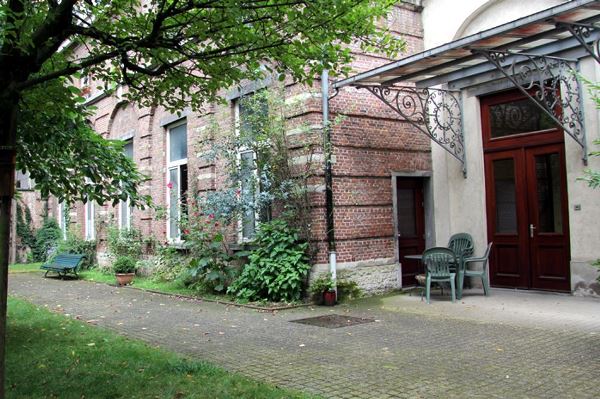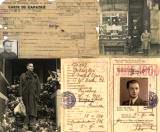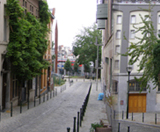New videos (only partially in English)
Summary, abstract and full texts n° 106
Philippe Mesnard and Yannis Thanassekos: Editorial: Sous le signe de la catastrophe ? (pdf in French)(pdf in Dutch)
Dossier: Faux Témoins [False Witnesses]
Coordinated by Jacques Walter
Jacques Walter: Des faux témoins à l’épreuve (pdf)
Alexandre Prstojevic: Faux en miroir : fiction du témoignage et sa réception (pdf)
- The article deals with the question of historical testimony and narrative fiction, on the basis of the following three texts: Yossel Rakover talks to God by Zvi Kolitz, The Painted Bird by Jerzy Kosinski and Fragments by Benjamin Wilkomirski.
A comparative reading of these three fictional texts, published at different times – 1946, 1965, 1996 – but which have all been read as authentic testimony on the Shoah, seems to suggest that they were accepted as authentic because they were plausible in three ways, biographically, historically and culturally.
The author concludes that the close interweaving of documentary and fiction around an authentic event illustrates the impossibility of determining whether a text is fact or fiction from its content. He shows that the identity of a work has many factors, especially when it is a fictional text dealing with historical events, because it is developed from two diametrically opposed starting points – the artistic imagination, with the full spectrum of its formal possibilities, and the unforeseeable reception of the text which depends both on its meaning and on the socio-political context in which it appears.
Bernard Dan: Yosl Rakover s’adresse à nous : vrai comme seule la fiction peut l’être (pdf)
- Yosl Rakover’s philosophical testament, is presented as a text that was purposely hidden and subsequently saved from the ruins of the ghetto of Warsaw, just as Emmanuel Ringelblum’s chronicle. Its opening reads like the last entry of a diary: "Warsaw, 28 April 1943. I, Yosl, son of David Rakover of Tarnopol, disciple of the Rabbi of Ger descendant of the righteous, the learned and the pious from Rakover and Maysel families, write these lines while the houses in the ghetto of Warsaw are ablaze and the one where I am has not been set on fire yet." Just like Job, the author addresses his God who fails to reply and he searches for a meaning in the tragedy that has slaughtered his people, his family and that will soon kill him too. The text entitled Yosl Rakover talks to God was first published in a Yiddish periodical in Buenos Aires in 1946, bearing the signature of Zvi Kolitz, who was a delegate at the World Zionist Congress and clandestine recruiter for the Irgun. Despite the writer’s signature attached to the original publication, the story spread around the world from the 1950s as though it were an authentic testimony. The power or scope of the text were not reduced following the late disclosure of the fictional nature of the "testimony" that had been commented with much enthusiasm by Thomas Mann and Emmanuel Lévinas, and still get reprinted in anthologies of texts on the Shoah and even in prayer books. How is this success to be understood? And how can one explain the striking contrast between the continuity of this success and the scandal that resulted from other disclosures (e.g. Misha: A Mémoire of the Holocaust Years / Survivre avec les Loups)? One avenue could be the absence of real historic pretense in a subjective narrative transformed into a reflexive (as opposed to descriptive) "testimony", which opens up reflection on how subjects alienated to their oppressor can recover a role within their own system of values.
- Enric Marco is an archetypal imposter. For 30 years, he projected an image based on his experiences in the concentration camps, until the historian Benito Bermejo proved that he had never been in either Flossenbürg or Mauthausen. In May 2005, reactions in the public arena were inevitable, owing to the celebrity which the false witness had acquired by representing the associations of parents of pupils in Catalonia (over 100 conferences a year), as president of the association of survivors of Mauthausen and other camps (the main association of camp prisoners) and bearer of the Cross of Saint Jordi – institutional recognition – but also, and above all, as the personification of the 10,000 Spanish Republicans deported to the Nazi camps. Discussion of the false witness, statements of opinion published in the daily press and the continuing association of Enric Marco with falsehood, amplified by the media, have continued to the present day.
- Arthur Conte relates his camp experience in Les Impitoyables. Trois nouvelles d’Allemagne [The Pitiless. Three stories from Germany] (1946). In one ("Neue Bremm or Jean-Pierre’s Notebook"), the former forced laborer makes use of a "hidden agenda", symptom of a form of guilt. This has its consequences for the position of the researcher with Gestapo archives at his disposal. The problem resurfaces with the novel Au-delà de la montagne [Beyond the Mountain] (1948) on the Spanish Civil War. Still in the person of Jean-Pierre, he transposes the story into another story whose hero is a member of the resistance, Manuel. This may provoke an accusation of false testimony, but not for long: the author’s history is well-known, and this is clearly a case of the reworking of testimony and literary material. The reflection from the short story makes it possible to untangle what is involved in a migration of fragments relating to the camp and the transformation, suppression or addition of factual or imagined details.
Aminata Niang, Sylvie Thiéblemont-Dollet: Entre fictions et témoignages autour du camp de Thiaroye. Une reconstruction d’un épisode de l’histoire coloniale française
- Following the 1944 mutiny by Senegalese soldiers in the camp of Thiaroye, its repression by the French army, and Ousmane Sembène’s 1988 film Camp de Thiaroye, a fictional re-telling of the dramatic event which was a huge success, a considerable amount of false testimony has circulated among the population of Senegal (including immigrants).
Julien Mary: 14-18, le bruit et la fureur, ou quand l’historien se fait témoin… (pdf)
- The docudrama 14-18, le bruit et la fureur [14-18, The Sound and the Fury], does not let the voices of the combatants be heard. Illustrated by "archive film" with color and sound added which give an essentially propaganda image of the 1914-18 war, the narrator’s words, those of an imaginary Tommy, are pasted onto a work created 80 years after the end of the war. Why opt for fictional testimony to explain a past which is rich in real testimony? What does this choice reveal about the issues underlying such a production?
Alpha Ousmane Barry: Faux témoignages de fidélité en Guinée. Allégeance au parti ou aliénation à Sékou Touré ?
- The testimony exhibits a variety of declaratory scenarios which, far from being sincere, simply demonstrate an effective manipulation. Behind the screen show validating his ideological allegiance, the subject betrays his conscience through a gesture of submission to the established order, with a view to protecting himself against an accusation of plotting. Thus the maneuver as a whole is aimed at mastering the mechanisms of psychological pressure specific to totalitarian regimes.
Other subjects
Michael Rothberg (interviewed by Fransiska Louwagie and Pieter Vermeulen): L’Holocauste et l’imagination comparative (pdf) – Original version: The Holocaust and the Comparative Imagination (pdf)
- This article, which deals essentially with the secret diary kept by Renata Laqueur while she was imprisoned in Bergen-Belsen, is structured round the motives which may lead a prisoner in a camp to write. How is the experience of the camp conveyed in the diary? Is it possible to identify strategies of writing, conscious or otherwise? Can social practices be correlated with these possible strategies? Do they provide information on the relation between the prisoner and her environment? Is the diary a literary achievement? By deciphering the purpose and components of the diary, the author examines the nature of what he considers to be an "act of communication".
- The Deustche Vortrupp. Gefolgschaft deutscher Juden, a German-Jewish organization, was founded in 1933 and officially dissolved in 1935. This study reveals its specific ideological profile, characterized by a marked commitment to the Jewish community of Germany and by manifestations of sympathy for the National Socialist movement. The author attributes the Deustche Vortrupp’s principal ideas to the organization’s overlapping involvement in different areas, such as the German Jewish community, the German youth movement and the "conservative revolution".
Some of our projects
Contact
Auschwitz Foundation – Remembrance of Auschwitz
Rue aux Laines 17 box 50 – B-1000 Brussels +32 (0)2 512 79 98
+32 (0)2 512 79 98 info@auschwitz.be
info@auschwitz.be
BCE/KBO Auschwitz Foundation: 0876787354
BCE/KBO Remembrance of Auschwitz: 0420667323
Office open from Monday to Friday 9:30am to 4:30pm.
Visit only by appointment.![]()
![]()
![]()
![]()
Become a member
To become a member of Remembrance of Auschwitz ASBL, take part in its activities and support its actions, please contact us.
Membership costs €40.00, payable to account n° 310-0780517-44 (IBAN : BE55 3100 7805 1744 – BIC : BBRUBEBB)
Donations of more than €40.00 qualify for a tax exemption for Belgian tax-payers.










 The Auschwitz Foundation was founded in 1980 by Paul Halter, an Auschwitz survivor. Replacing the Amicale Belge des Ex-Prisonniers politiques d’Auschwitz-Birkenau Camps et Prisons de Silésie, the primary objective of the Auschwitz Foundation is to study the history and memory of the victims of the Holocaust and the Nazi terror in a sustainable and systematic way. The transmission of memory and the preservation of archives concerning these events complete this goal.
The Auschwitz Foundation was founded in 1980 by Paul Halter, an Auschwitz survivor. Replacing the Amicale Belge des Ex-Prisonniers politiques d’Auschwitz-Birkenau Camps et Prisons de Silésie, the primary objective of the Auschwitz Foundation is to study the history and memory of the victims of the Holocaust and the Nazi terror in a sustainable and systematic way. The transmission of memory and the preservation of archives concerning these events complete this goal.





